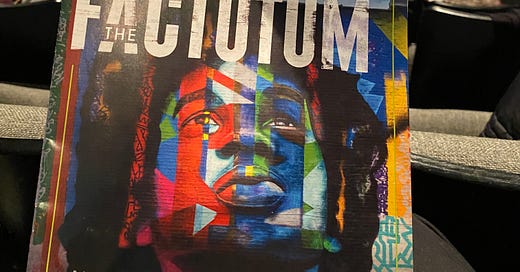Make Way for The Factotum
The Factotum, which I saw at performed by the Lyric Opera of Chicago this past weekend, gets its title from Figaro’s aria “Largo al Factotum” from Rossini’s The Barber of Seville.
The word means a person with many different responsibilities. A poster in the Harris Theater’s lobby lists some of a barber’s roles in the community: creator, confidant, mentor, activist, therapist, storyteller, entrepreneur.
While The Factotum, which takes place in a Black barbershop on Chicago’s South Side, doesn’t really follow The Barber of Seville’s plot, it does, like the original, have plenty of comedic moments. However, in The Factotum — unlike The Barber of Seville — mistaken identity ends in an instance of police violence.
The Factotum was co-written by Will Liverman and DJ King Rico. Liverman appeared as Charles in Terence Blanchard’s Fire Shut Up in My Bones at the Met Opera.
I learned, in a Jan. 7 panel as part of “Works & Process” at the Guggenheim, that much of The Factotum’s legwork happened during Fire’s production. For the longest time, said dramaturgist Rajendra Ramoon Maharaj, “Black people ignored opera because opera ignored us.”
For much of The Factotum, the DJ is onstage, evoking the role of the piano in Umberto Giordano’s Fedora. The music, at times saccharine, made good use of violin and saxophone. (Marcus Norris did the orchestration).
During the scene where Cece is tased — especially poignant after Tyre Nichols’ death — I felt the music didn’t fully encapsulate the situation’s gravity. When the curtain dropped, the audience clapped. I cringed. It wasn’t a clapping moment.
The final chorus, “No matter what will come, we’ll stick it out together,” meant to evoke a hymn, sounded too much like a Christmas carol.
However, my main criticism of The Factotum was that the male singers were much stronger than the female ones. (This isn’t exactly surprising, as the barbershop is a predominantly male space.)
Baritone Norman Garret was just fantastic as Garby, the problematic barbershop owner who runs an ilegal gambling ring.
When tenor Martin Luther Clark, as CJ, sang that his love interest, Rose, had “the voice of angel,” he could have been describing himself. The person sitting next to me couldn’t have expressed it better: “That’s some damn good singing.”
However, Liverman as Mike, Garby’s brother, was something else. His Hamilton-esque “prologue,” dark baritone mixing with King Rico’s beats, was so effing cool. His admirable attempts not to totally steal the spotlight just left me saying, “More, please.”
On the other hand, soprano Cecilia Violetta López, as Rose, was, at times, shrill and hollow sounding. I was confused about her tessitura, as her focal aria, which she sings in a nightclub, sounded an octave lower than the rest of her lines.
Melody Betts, as Chantel, sounded harsh initially, but soon warmed up. However, her Broadway-trained voice, with impressive riffs, didn’t always meld with the operatic ones.
Dancer Nissi Shalome was captivating as Mike’s daughter, Cece, a mostly non-speaking role. But Cece’s muteness was never fully explained. And when she did sing, following the tasing, her voice sounded pinched.
Despite The Factotum’s imperfections, what it is trying to do is incredibly important. I believe that opera — being a union of music, writing, and dance — has the inherent potential for intersectionality. It is pitiful that it’s taken until 2023 for productions to begin to reflect this.
While classical music has made some strides in terms of diversity, this is not true of criticism. I fully admit that I’m not the best person to write about The Factotum. I don’t know what it’s like to go to a Black barbershop. And I’m not very familiar with the worlds of rap, hip-hop, R&B, or gospel.
Where are the BIPOC opera writers? We must lift them up, too. I want to hear what they have to say.





